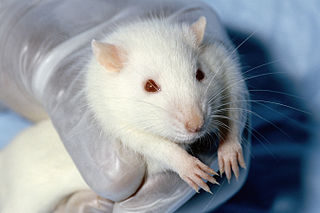
Animal testing, also known as animal experimentation, animal research, and in vivo testing, is the use of non-human animals in experiments that seek to control the variables that affect the behavior or biological system under study. This approach can be contrasted with field studies in which animals are observed in their natural environments or habitats. Experimental research with animals is usually conducted in universities, medical schools, pharmaceutical companies, defense establishments, and commercial facilities that provide animal-testing services to the industry. The focus of animal testing varies on a continuum from pure research, focusing on developing fundamental knowledge of an organism, to applied research, which may focus on answering some questions of great practical importance, such as finding a cure for a disease. Examples of applied research include testing disease treatments, breeding, defense research, and toxicology, including cosmetics testing. In education, animal testing is sometimes a component of biology or psychology courses. The practice is regulated to varying degrees in different countries.

In the animal rights movement, cruelty-free is a label for products or activities that do not harm or kill animals anywhere in the world. Products tested on animals or made from animals are not considered cruelty-free, since these tests are often painful and cause the suffering and death of millions of animals every year.
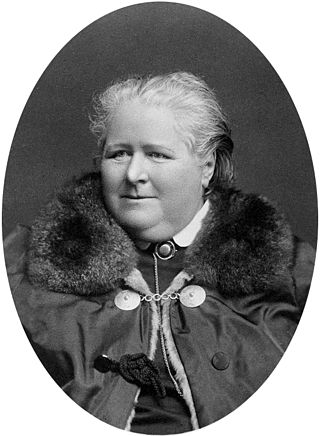
Frances Power Cobbe was an Anglo-Irish writer, philosopher, religious thinker, social reformer, anti-vivisection activist and leading women's suffrage campaigner. She founded a number of animal advocacy groups, including the National Anti-Vivisection Society (NAVS) in 1875 and the British Union for the Abolition of Vivisection (BUAV) in 1898, and was a member of the executive council of the London National Society for Women's Suffrage.

Animal Aid is a British animal rights organisation, founded in 1977 by Jean Pink. The group campaigns peacefully against the consumption of animals as food and against animal cruelty such as their use for medical research—and promotes a cruelty-free lifestyle. It also investigates and exposes animal abuse.
Shamrock Farm was the United Kingdom's only non-human primate importation and quarantine centre, located in Small Dole, near Henfield in West Sussex. The centre, owned by Bausch and Lomb and run by Charles River Laboratories, Inc. for Shamrock (GB) Ltd, provided animals to various laboratories and universities for use in animal testing. It was Europe's largest supplier of primates to laboratories, and held up to 350 monkeys at a time.
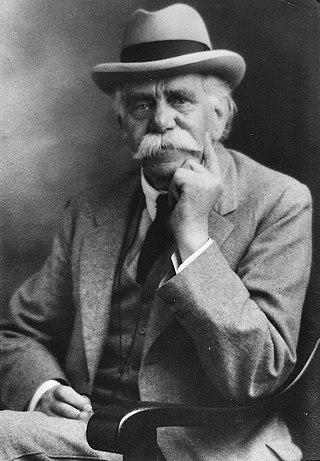
Walter Robert Hadwen was an English general practitioner, pharmaceutical chemist and writer. He was president of the British Union for the Abolition of Vivisection (BUAV) and an anti-vaccination campaigner, known for his denial of the germ theory of disease.

Cambridge University primate experiments came to public attention in 2002 after the publication that year of material from a ten-month undercover investigation in 1998 by the British Union for the Abolition of Vivisection (BUAV). The experiments were being conducted on marmosets, and included the removal of parts of their brains intended to simulate the symptoms of stroke or Parkinson's disease. Some of the research was theoretical, aimed at advancing knowledge of the brain, while some of it was applied.
Gillian Rose Langley is a British scientist and writer who specialises in alternatives to animal testing and animal rights. She was, from 1981 until 2009, the science director of the Dr Hadwen Trust for Humane Research, a medical research charity developing non-animal research techniques. She was an anti-vivisection member of the British government's Animal Procedures Committee for eight years, and has worked as a consultant on non-animal techniques for the European Commission, and for animal protection organizations in Europe and the United States. Between 2010 and 2016 she was a consultant for Humane Society International.
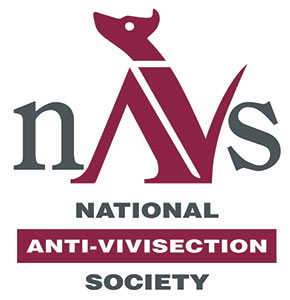
The National Anti-Vivisection Society (NAVS) is an international not-for-profit animal protection group, based in London, working to end animal testing, and focused on the replacement of animals in research with advanced, scientific techniques. Since 2006, the NAVS has operated its international campaigns under the working name Animal Defenders International (ADI), and the two groups now work together under the ADI name.

Experiments involving non-human primates (NHPs) include toxicity testing for medical and non-medical substances; studies of infectious disease, such as HIV and hepatitis; neurological studies; behavior and cognition; reproduction; genetics; and xenotransplantation. Around 65,000 NHPs are used every year in the United States, and around 7,000 across the European Union. Most are purpose-bred, while some are caught in the wild.

Alternatives to animal testing are the development and implementation of test methods that avoid the use of live animals.
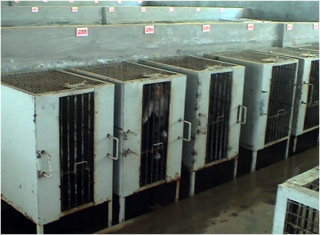
Nafovanny in Vietnam is the largest captive-breeding primate facility in the world, supplying long-tailed macaques to animal testing laboratories, including Huntingdon Life Sciences in the UK and Covance in Germany.

Cosmetic testing on animals is a type of animal testing used to test the safety and hypoallergenic properties of cosmetic products for use by humans.
Women have played a central role in animal advocacy since the 19th century. The animal advocacy movement – embracing animal rights, animal welfare, and anti-vivisectionism – has been disproportionately initiated and led by women, particularly in the United Kingdom. Women are more likely to support animal rights than men. A 1996 study of adolescents by Linda Pifer suggested that factors that may partially explain this discrepancy include attitudes towards feminism and science, scientific literacy, and the presence of a greater emphasis on "nurturance or compassion" amongst women. Although vegetarianism does not necessarily imply animal advocacy, a 1992 market research study conducted by the Yankelovich research organization concluded that "of the 12.4 million people [in the US] who call themselves vegetarian, 68% are female, while only 32% are male".

The American Anti-Vivisection Society (AAVS) is a Jenkintown, Pennsylvania-based organization created with the goal of eliminating a number of different procedures done by medical and cosmetic groups in relation to animal cruelty in the United States. It seeks to help the betterment of animal life and human-animal interaction through legislation reform. It was the first anti-vivisection organization founded in the United States.
Beauty Without Cruelty (BWC) is an animal issues charity in South Africa, established in 1975. Its initial focus was animal testing, fur and ivory. It has subsequently expanded to include educating and offering kind options in all areas of animal exploitation. Beauty Without Cruelty is an animal rights organisation with a primary objective to educate and inform the public about the exploitation, abuse and suffering of all animals and to offer humane, non-animal alternatives, to replace cruel and harmful lifestyle choices. They receive no government or lottery funding and rely entirely on the generosity of supporters to continue work for animals. Beauty Without Cruelty means living without cruelty.
The New England Anti-Vivisection Society (NEAVS) is a national, registered 501(c)(3) nonprofit organization "dedicated to ending the use of animals in research, testing, and science education" and replacing them with "modern alternatives that are ethically, humanely, and scientifically superior."

The Anti-Vivisection Coalition (AVC) is a United Kingdom-based pressure group which campaigns against animal testing. The AVC are described as 'main driver' of the Stop Vivisection Initiative, a petition launched in November 2012 which attracted more than a million signatures. The Stop Vivisection Initiative called upon the European Union to ban animal testing. If the signatures are verified, "the initiative will be granted hearings at the European Commission and the European Parliament".
The European Coalition to End Animal Experiments (ECEAE) is a European organisation actively operating in favor of animal rights and in particularly, an abolishment of testing on animals. The focus is on animal testing in cosmetics and experiments with primates. The ECEAE was created in 1990 by national and regional organisations against the testing of cosmetics on animals. 18 European animal rights organisations comprise the ECEAE. The ECEA releases publications, organizes violent free actions and campaigns and lobbies in the European Parliament, against animal testing. Their goal is to form a lobby group with the European Union and inform the public and raise public awareness.
Animal welfare and rights in Switzerland is about the treatment of and laws concerning non-human animals in Switzerland. Switzerland has high levels of animal welfare protection by international standards.











